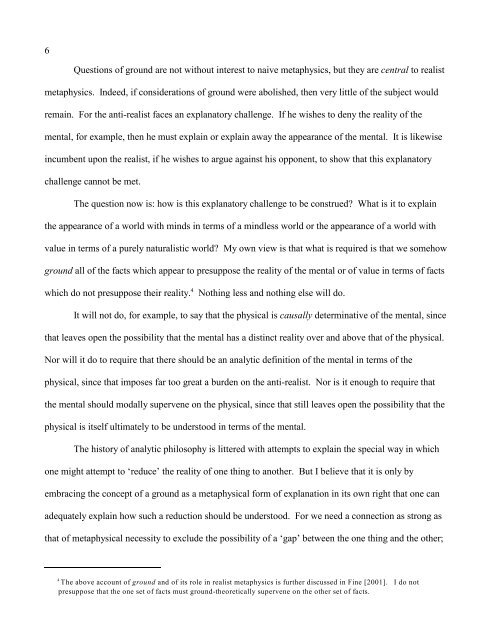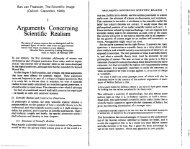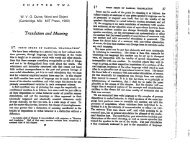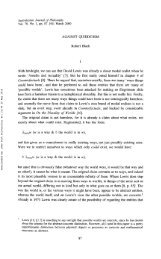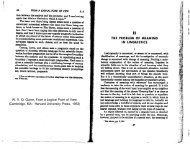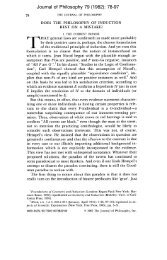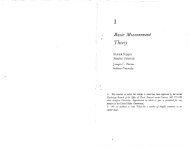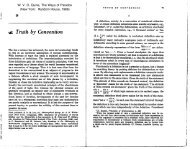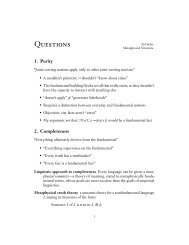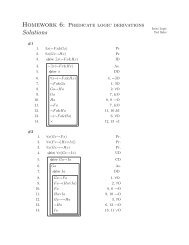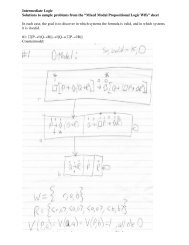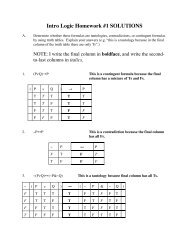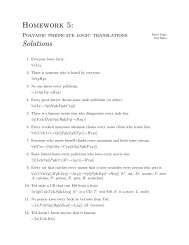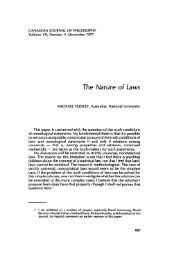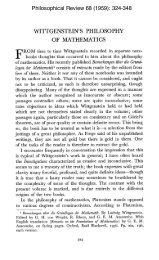Fine - guide to ground.pdf - Ted Sider
Fine - guide to ground.pdf - Ted Sider
Fine - guide to ground.pdf - Ted Sider
You also want an ePaper? Increase the reach of your titles
YUMPU automatically turns print PDFs into web optimized ePapers that Google loves.
6<br />
Questions of <strong>ground</strong> are not without interest <strong>to</strong> naive metaphysics, but they are central <strong>to</strong> realist<br />
metaphysics. Indeed, if considerations of <strong>ground</strong> were abolished, then very little of the subject would<br />
remain. For the anti-realist faces an explana<strong>to</strong>ry challenge. If he wishes <strong>to</strong> deny the reality of the<br />
mental, for example, then he must explain or explain away the appearance of the mental. It is likewise<br />
incumbent upon the realist, if he wishes <strong>to</strong> argue against his opponent, <strong>to</strong> show that this explana<strong>to</strong>ry<br />
challenge cannot be met.<br />
The question now is: how is this explana<strong>to</strong>ry challenge <strong>to</strong> be construed? What is it <strong>to</strong> explain<br />
the appearance of a world with minds in terms of a mindless world or the appearance of a world with<br />
value in terms of a purely naturalistic world? My own view is that what is required is that we somehow<br />
<strong>ground</strong> all of the facts which appear <strong>to</strong> presuppose the reality of the mental or of value in terms of facts<br />
4<br />
which do not presuppose their reality. Nothing less and nothing else will do.<br />
It will not do, for example, <strong>to</strong> say that the physical is causally determinative of the mental, since<br />
that leaves open the possibility that the mental has a distinct reality over and above that of the physical.<br />
Nor will it do <strong>to</strong> require that there should be an analytic definition of the mental in terms of the<br />
physical, since that imposes far <strong>to</strong>o great a burden on the anti-realist. Nor is it enough <strong>to</strong> require that<br />
the mental should modally supervene on the physical, since that still leaves open the possibility that the<br />
physical is itself ultimately <strong>to</strong> be unders<strong>to</strong>od in terms of the mental.<br />
The his<strong>to</strong>ry of analytic philosophy is littered with attempts <strong>to</strong> explain the special way in which<br />
one might attempt <strong>to</strong> ‘reduce’ the reality of one thing <strong>to</strong> another. But I believe that it is only by<br />
embracing the concept of a <strong>ground</strong> as a metaphysical form of explanation in its own right that one can<br />
adequately explain how such a reduction should be unders<strong>to</strong>od. For we need a connection as strong as<br />
that of metaphysical necessity <strong>to</strong> exclude the possibility of a ‘gap’ between the one thing and the other;<br />
The above account of <strong>ground</strong> and of its role in realist metaphysics is further discussed in <strong>Fine</strong> [2001]. I do not<br />
4<br />
presuppose that the one set of facts must <strong>ground</strong>-theoretically supervene on the other set of facts.


